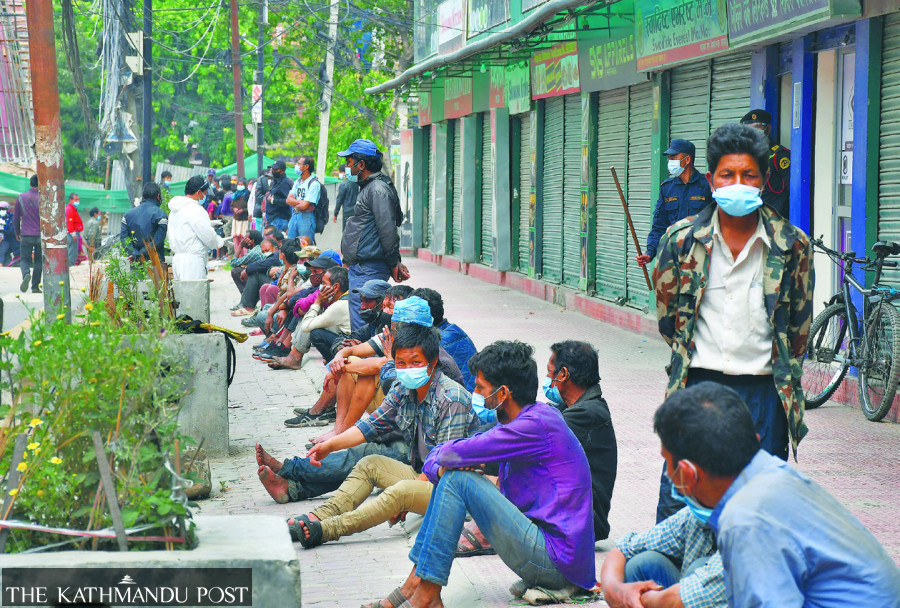National
Government yet to identify beneficiaries for its cash scheme for pandemic-hit poor
The Deuba government plans to distribute Rs10,000 each to 500,000 poor households by mid-October.
Prithvi Man Shrestha
The government has announced its plan to spend Rs5 billion in the name of the poor people but it is still unclear who the beneficiaries are.
On September 10, the Sher Bahadur Deuba government announced through a bill brought to replace the ordinance budget passed by the former government that it would provide a cash grant of Rs10,000 each to 500,000 poor households who lost employment and livelihoods to the Covid-19 pandemic. As per the government’s announcement, it is a one-time cash distribution.
While the government has said that the cash would be distributed based on certain criteria, it has not yet made clear how the beneficiaries would be chosen. The government also plans to distribute the amount by mid-October during the festival season covering Dashain and Tihar.
Finance Secretary Madhu Marasini told the Post that the ministry was preparing a working procedure regarding who would be the beneficiaries of this cash distribution scheme.
The government’s announcement comes when there is no Covid-19 lockdown in the country.
Throughout the lockdown during the second wave of the Covid-19 pandemic when many people turned unemployed, no such relief measures were announced for the poor.
Last year, when a lockdown was enforced for the first time starting March 23, 2020, the federal and local governments had announced relief packages for the poor people affected by the lockdown and the local governments of Kathmandu, Lalitpur and Bhaktapur among other municipalities in the country had made arrangements to distribute food and other relief materials including free meals targeting the daily wage workers and the destitute.
According to the Federal Affairs Ministry, 5.7 million people from 1.8 million families were provided relief packages during last year’s lockdown. About Rs3 billion was spent on relief last year, according to the ministry.
Former vice-chairperson of the National Planning Commission Jagadish Chandra Pokharel said that even though there are families who are in need of state support, the question of how the government would identify the poor people who lost their livelihoods due to the pandemic remains unanswered.
Even though the Ministry of Land Management, Cooperative, and Poverty Alleviation has already identified poor families in 49 districts, it is not clear whether the government plans to distribute the cash grants based on the ministry’s data.
“We know who the beneficiaries are, you will see once the working procedure is out,” Marasini, the finance secretary, told the Post.
But according to an official at the Poverty Alleviation Ministry, the Finance Ministry has not yet consulted with the Poverty Alleviation Ministry about the new scheme.
“The Finance Ministry has its own thoughts on the beneficiaries. There has been no consultation so far about how to identify the poor households and distribute the cash,” Janakraj Joshi, spokesperson at the Poverty Alleviation Ministry, said.
According to the ministry, it has already identified 391,381 poor households by surveying 1.22 million households in 26 districts.
“Likewise, around 290,000 poor households have also been identified in other 23 districts but the government has yet to give its nod to the identified data,” said Joshi.
The ministry had surveyed 1.15 million households to identify the poor households in 23 districts.
According to Joshi, a survey has been completed in 15 other districts while there is a plan to conduct a survey in the remaining 13.
While the survey has identified poor families irrespective of whether they became poor because of the pandemic or not, the government has announced that only those rendered poor by the pandemic will be eligible for the cash grant.
“The government may be required to identify the new poor in a short period of time is a challenging task even with the help of local governments,” said Pokharel, the former vice-chairperson of the National Planning Commission. “In such a situation, families who are genuinely poor may not have access to information about the scheme and may be deprived of the grant. The likelihood of cash being distributed among the ruling party’s supporters cannot be ruled out if the identified poor are over 500,000 and there are no strict criteria regarding the beneficiaries.”




 11.84°C Kathmandu
11.84°C Kathmandu













